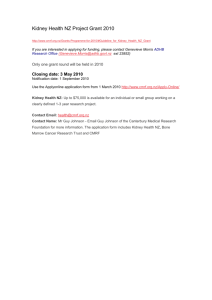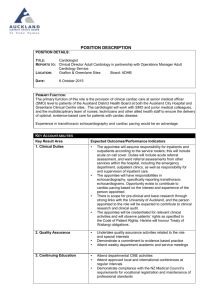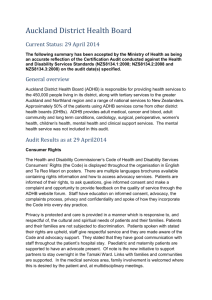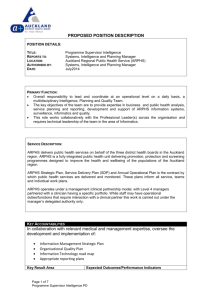Application for approval of a low risk study v2
advertisement
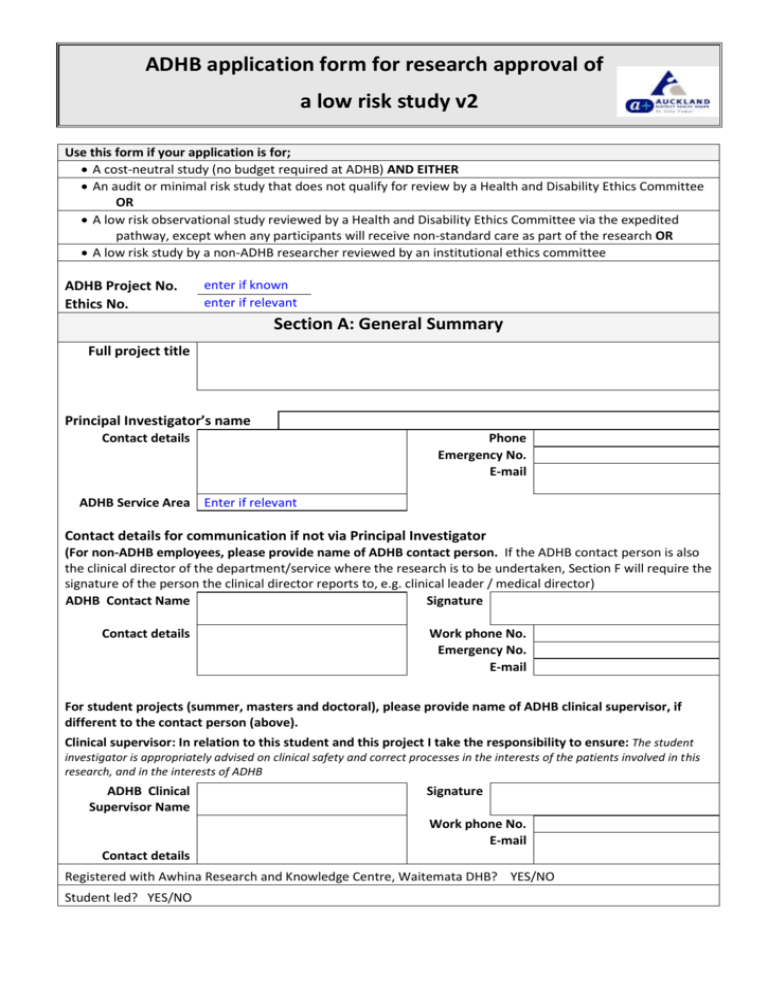
ADHB application form for research approval of a low risk study v2 Use this form if your application is for; A cost-neutral study (no budget required at ADHB) AND EITHER An audit or minimal risk study that does not qualify for review by a Health and Disability Ethics Committee OR A low risk observational study reviewed by a Health and Disability Ethics Committee via the expedited pathway, except when any participants will receive non-standard care as part of the research OR A low risk study by a non-ADHB researcher reviewed by an institutional ethics committee ADHB Project No. Ethics No. enter if known enter if relevant Section A: General Summary Full project title Principal Investigator’s name Contact details Phone Emergency No. E-mail ADHB Service Area Enter if relevant Contact details for communication if not via Principal Investigator (For non-ADHB employees, please provide name of ADHB contact person. If the ADHB contact person is also the clinical director of the department/service where the research is to be undertaken, Section F will require the signature of the person the clinical director reports to, e.g. clinical leader / medical director) ADHB Contact Name Signature Contact details Work phone No. Emergency No. E-mail For student projects (summer, masters and doctoral), please provide name of ADHB clinical supervisor, if different to the contact person (above). Clinical supervisor: In relation to this student and this project I take the responsibility to ensure: The student investigator is appropriately advised on clinical safety and correct processes in the interests of the patients involved in this research, and in the interests of ADHB ADHB Clinical Supervisor Name Signature Work phone No. E-mail Contact details Registered with Awhina Research and Knowledge Centre, Waitemata DHB? YES/NO Student led? YES/NO Section B: Type of study Indicate all that apply1 Audit – YES / NO Outcome analysis – YES / NO Other audit-like activity – YES / NO The above types of studies will not normally require ethical approval as long as the study relates to the primary purpose the data was collected for, and the investigators are employees or contracted to ADHB, or when the health information used does not identify individuals. Case report – YES/ NO Case series – YES / NO Case reports and case series normally require documented informed consent of the participant and/or the approval of an ethics committee Cohort study – YES / NO Case-control study – YES / NO Cross-sectional study – YES / NO Descriptive study – YES / NO Anonymous survey – YES / NO Registry – YES / NO If YES, ensure Section D is answered Low risk interventional study – YES / NO Other – YES / NO If YES, describe Section C: Responsiveness to Māori Required for all applications – if you have completed an application to a Health and Disability Ethics Committee (HDEC) you can copy and paste where relevant C1. Please describe whether and how your study may benefit Māori (p.4.1. HDEC form) Start typing here C2.a. Will participants’ ethnicity status be collected as part of your study? YES / NO (p.4.6. HDEC form) C2.b. If NO please explain why? Start typing here The below links to endorsed, standard ethnicity data protocols for the Health and Disability Sector http://www.health.govt.nz/publication/ethnicity-data-protocols-health-and-disability-sector C3. Is an analysis (or sub-analysis) of outcomes by Māori ethnicity planned? YES / NO If YES describe Start typing here If NO please explain why? Start typing here C4 – (not required for retrospective notes review only) C4. Please provide a brief, plain English summary of your study (a.1.5. HDEC form OR 150 words or less) Start typing here For definitions of types of study refer to the National Ethics Advisory Committee’s “Ethical Guidelines for Observational Studies - Observational research, audits and related activities: Revised edition 2012” http://neac.health.govt.nz/streamlined-ethical-guidelines-health-and-disabilityresearch 1 ADHB Application form for research approval of a low risk study v2 July 2014 2 of 6 C5.a. How many participants will be recruited for the study? If study is retrospective (e.g. an outcome analysis) please estimate the number of patients whose records will be reviewed. Worldwide Aotearoa New Zealand C5.b. How many participants are expected to be Māori? Give % and absolute number and cite the reference source Start typing here The below links may help you find Māori health statistics for the health issue you are researching: Ministry of Health: http://www.health.govt.nz/nz-health-statistics Statistics NZ: http://www.stats.govt.nz/infoshare/?gclid=CMWcuqfZorUCFct7QgodkSgAVQ C6.a. Might your study contribute to reducing inequalities in health outcomes between Māori and other New Zealanders? YES / NO (f1.1. HDEC form) C6.b.Explain why YES or NO (f.1.2. HDEC form) Start typing here C7. How will Māori participants be recruited? (where?, how?, by whom?) - outline steps to ensure adequate participation. Start typing here C8. Please identify the main cultural issues that may arise for Māori who may participate in your study and explain how these issues will be managed2 (p.4.2. HDEC form) Start typing here HRC Guidelines for Researchers on Health Research involving Māori http://www.hrc.govt.nz/ Te Ara Tika: Guidelines for Maori Research Ethics http://www.hrc.govt.nz/sites/default/files/Te%20Ara%20Tika%20Guidelines%20for%20Maori%20Research%20 Ethics.pdf C9.a. Is there a Māori dissemination strategy? YES / NO C9.b. If YES please describe Start typing here Section D: Ethical considerations Only complete Section D if you HAVE NOT completed an application for approval by a Health and Disability Ethics Committee. If you have completed a Health and Disability Ethics application, do not complete Section D, but submit the application along with this form. If you have submitted an application for ethical approval to an institutional ethics committee, complete Section D and also submit the ethics application along with this form D1. What benefits do you expect the study to provide? Start typing here Some examples of research processes with cultural issues for Māori include genetic testing, tissue banking, collective informed consent, privacy and confidentiality of personal information. 2 ADHB Application form for research approval of a low risk study v2 July 2014 3 of 6 D2. What risks do you expect the study to pose? Start typing here D3. What steps will you take to minimise expected risk? Start typing here D4.1 Will you be collecting information directly from individuals? YES / NO If YES, explain how will you identify and/or approach potential participants? Type your answer here or Not Applicable D4.2 Explain why your method of approaching participants will be acceptable and safe. Type your answer here or Not Applicable D5. Will you be collecting information about individuals from a third party? If so, a) what is the party’s relationship to the participants, and b) why is it appropriate to gain the information from that person? Type your answer here or Not Applicable D6. Will you be obtaining information from health records (patient clinical records)? – YES / NO D7. Will you be obtaining information from health databases or registries? – YES / NO D8. Will you be accessing health information about identifiable or potentially identifiable individuals (this means you – the researcher - will or might be able to tell the identity of the individuals)? – YES / NO (if NO go straight to Section D ) D9. If participants will be identifiable or potentially identifiable, will you obtain the consent of the individuals concerned? – YES / NO D10.a. If YES to D9, describe the process of informed consent and attach any participant information and declaration of informed consent forms that will be used in the study. Type your answer here or Not Applicable D10.b. If your study involves entering patient data into a registry or database and you will NOT be using a formal process of informed consent, describe what information you will be giving to patients about how their data will be used and if they will have an option to “opt out” Type your answer here or Not Applicable D11. If NO to C9, justify the collection and use of patient information without consent for this study Type your answer here or Not Applicable D12. Explain all measures taken to preserve the confidentiality of the patient information, including how it is stored, which study personnel will have access, and for how long it will be stored before destruction. Type your answer here or Not Applicable IMPORTANT - If you will not be obtaining informed consent to use identified patient information, and any combination of the below apply, you will need ethical approval from a Health and Disability Ethics Committee You are not employed by or contracted to ADHB, You will be retaining unique identifiers (e.g. NHI) in your dataset that could link to other databases/registries You will be obtaining health information from other health care organisations in addition to ADHB Section E: Proposal Required for all application. Ensure you provide sufficient information for a non-lay reviewer to understand the proposal. E1. Briefly, what is the principal study ADHB Application form for research approval of a low risk study v2 July 2014 4 of 6 question (hypothesis) that your study will examine? E2. If you are obtaining information directly from individuals, describe what taking part in the study will involve for participants. E3. Briefly explain how your study will contribute to new knowledge and improve health outcomes. E4. Brief description of study methods (1 page maximum) E5. Describe any impact upon ADHB resources (e.g. use of staff time, facilities, consumables), and describe reasons why no budget. Section F: ADHB DEPARTMENTAL SIGN-OFF (if research is to be undertaken by more than one ADHB department, obtain extra signatures as appropriate) Clinical Director / Service Manager / Leader / Medical Director / Nursing Leader (etc) : I am assured that I agree that the study aligns with department/service area interests and access to patients/staff/health information is justified YES / NO/ N/A I agree that access to care for non-study patients will not be adversely affected YES / NO / N/A I agree that any usage of existing and future resource has been fully identified and is acceptable YES / NO / N/A I agree that the study is clinically feasible and appropriate YES / NO / N/A I agree that staff workload is acceptable and PI and team are suitably qualified and experienced YES / NO / N/A I agree that the potential group of patients/clients are not over researched already YES / NO / N/A I agree that the department/service area manage the research in the time frame suggested YES / NO / N/A I agree that there are no conflict of interest issues that need declaring/addressing YES / NO / N/A ADHB Application form for research approval of a low risk study v2 July 2014 5 of 6 Name Do not sign if any of above are NO, if you are an investigator or supervisor, or you are not authorised to do so Dept / Service Area Signature Job title Comments or qualification? Date Name Do not sign if any of above are NO, if you are an investigator or supervisor, or you are not authorised to do so Dept / Service Area Signature Job title Comments or qualification? Date Section G: ADMINISTRATION AND DECLARATIONS Required for all applications G1. Proposed study start date at ADHB (cannot precede ADHB research approval) G2. Proposed completion date G3. I confirm I will inform the ADHB Research Office when the study is complete G4. (only sign if approval of a Health and Disability Ethics Committee is required) I confirm I will submit a progress report to the Health and Disability Ethics Committee annually, and a final report when the study has been completed. dd/mm/yyyy dd/mm/yyyy PI sign here PI sign here SUPPORTING DOCUMENTS CHECKLIST – remember to submit the following with this application form if relevant Ethics application form Ethics approval letter Study Protocol Participant Information Sheets and Informed Consent Forms Questionnaires / Surveys Evidence of Māori consultation Any other supporting documentation relevant to the application IMPORTANT – submit supporting documents in electronic version by email to the Research Office study coordinator (if known) or to the generic Research Office email address (researchoffice@adhb.govt.nz). Submit this fully signed application form in scanned or pdf version, via email (as above), or as a paper copy to: Low Risk Study Research Office Level 14, Support Building Auckland City Hospital Private Bag 92024 Auckland 1142 ADHB Application form for research approval of a low risk study v2 July 2014 6 of 6
